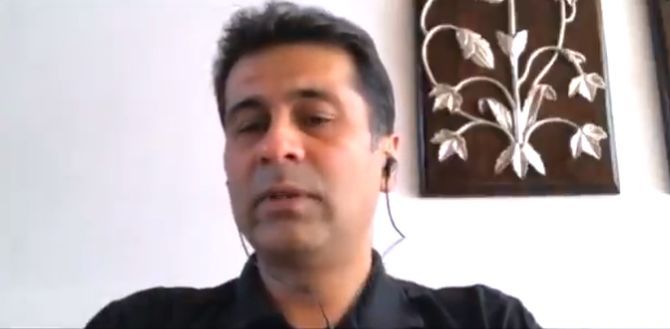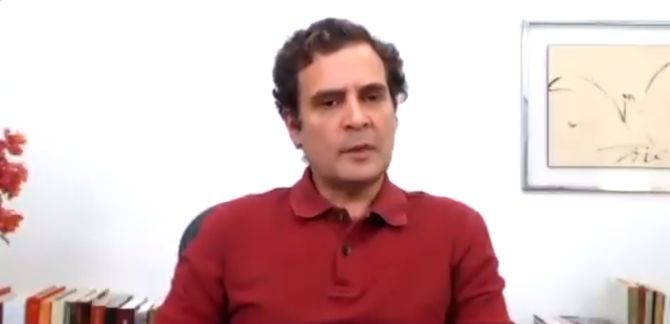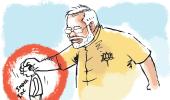India implemented a "draconian" lockdown that was porous and ended up with the "worst of both worlds" as it resulted in decimating its economy and flattening the GDP curve instead of that of the coronavirus infections, industrialist Rajiv Bajaj, below, said on Thursday.

He said it is a herculean task to open up the economy and called for taking fear out of people's minds through a "very clear, aligned narrative" from none other than the prime minister.
"We tried to implement a hard lockdown which was still porous. So I think we have ended up with the worst of both worlds," he said.
The managing director of Bajaj Auto was in a dialogue with Congress leader Rahul Gandhi, as part of a series on India's COVID-19 response and the lockdown initiated by the Congress and aired on the party's social media platforms.
Noting that "we are not seeing a smooth, concerted, rhythmic movement towards unlocking", the industrialist said the first problem is to get this fear out of the minds of the people.
"You have definitely decimated the economy. You flattened the wrong curve. It is not the infection curve, it is the GDP curve. This is what we have ended (up) with, the worst of both worlds," Bajaj said.
He said, "Unfortunately, India not only looked west, it went to the wild west. I think we stayed more towards the impervious side."
Noting that on one hand a porous lockdown made sure that the virus still exists and is still waiting to hit you when you unlock, he said, "So you have not solved that problem."
Airing the viewpoint of the industry, Bajaj said India now needs to generate demand for which a stimulus is required for providing cash to people.
"We have to get demand going again, we have to provide something that lifts the mood of the people. We need some mood elevator.
"And I do not understand why there is no strong initiative, even if it is for a period of six months-one year to strongly lift the mood of the people and provide a stimulus to demand," he said.
Bajaj cited instances of Japan and the US where up to USD 1,000 has been given to each person as support, not as stimulus.
"I am told in many places in the world, two-thirds of what the government has handed out had gone to organisations and people as direct benefits. Whereas in India, it has only been 10 pc. You would be better placed to comment on why we have not chosen to put more directly in the hands of people."
Bajaj said that being an Asian country, India sought not to look at what was happening in the East, and instead, looked at Italy, France, Spain, UK and the US which were not really the right benchmarks for it in any sense.
"Whether it is in terms of inherent immunity, temperature, demography, predisposition to thrombosis, etc. Everything that the scientists and doctors have spoken of, we should never have been looking there,” he said.
Asked by Gandhi about an "atmosphere of fear" in the country, Bajaj said that in terms of being tolerant and sensitive, India needs to mend a couple of things.
Gandhi, below, also said that the world did not go through a lockdown even during the world wars, as it has faced due to the coronavirus.

"It's quite surreal. I don't think anyone imagined that the world would be locked down in this way. I don't think even during the World Wars, the world was locked down. Even then, things were open. It's a unique and devastating sort of phenomena," the former Congress chief said.
He also noted that India's lockdown was such that "the disease is increasing after we are opening up".
Gandhi also said that the government needs to show compassion and listen to what its people are saying.
"There are people right now, screaming in pain, and the most obvious are manual labourers, daily wagers, farmers, small and medium businesses. But big businesses are also screaming in pain, because they don't see a future," he said.
"The leadership has to build confidence to...and carry everybody out together from this situation. So there is an empathy that has to be built into it," Gandhi said.
Talking about his views on the government's handling of the COVID-19 crisis, Gandhi said the discussion in the Congress party was that the response has to be decentralised, with the central government acting as a support system and an enabler.
Gandhi also termed it "a failed lockdown" where the disease is increasing after reopening.
Bajaj also referred to instances of individuals, including the old, being subjected to "humiliation" in the country for violation of lockdown rules.
"Where is proportion in the way we are treating our own people? You talked about compassion. I’m talking about examples that I have seen with my own eyes here. I have seen senior citizens being caned for simply stepping out to get some fresh air."
Noting that he was warned and dissuaded from speaking with Gandhi, the noted industrialist said there are also people who do not want to speak because they cannot deal with the backlash that comes their way.
On whether such an “atmosphere of fear” damages businesses, Bajaj said nobody will invest unless he does so with enthusiasm and confidence.
“If 100 people are afraid to speak up, first point is perhaps 90 of them anyway have something to hide. See, we must also accept that in the last few years, towards I would say UPA2 and NDA1, lot of skeletons have come out of the cupboard also,” he said.











 © 2025
© 2025